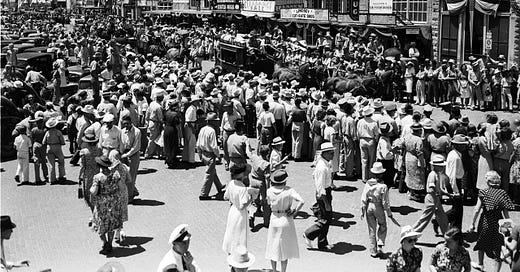There’s an iconic scene in “Jayber Crow” in which the eponymous town barber, church janitor, and gravedigger is handling his weekly janitorial duties. He stops to take a take a nap in the church sanctuary and then dreams of the people of Port William, both past and present:
My vision of the gathered church that had come to me...had been replaced by a vision of the gathered community. What I saw now was the community imperfect and irresolute but held together by the frayed and always fraying, incomplete and yet ever-holding bonds of the various sorts of affection. There had maybe never been anybody who had not been loved by somebody, who had been loved by somebody else, and so on and on... It was a community always disappointed in itself, disappointing its members, always trying to contain its divisions and gentle its meanness, always failing and yet always preserving a sort of will toward goodwill. I knew that, in the midst of all the ignorance and error, this was a membership; it was the membership of Port William and of no other place on earth. My vision gathered the community as it never has been and never will be gathered in this world of time, for the community must always be marred by members who are indifferent to it or against it, who are nonetheless its members and maybe nonetheless essential to it. And yet I saw them all as somehow perfected, beyond time, by one another's love, compassion, and forgiveness, as it is said we may be perfected by grace.
I’ve thought about this vision a great deal during and after my reading and re-reading of “Jayber Crow.” In many ways, this is Wendell Berry’s vision of a prosperous rural community. It is hardly idealistic. The description contains human imperfections and has the tensions of a flawed people striving to overcome their worst impulses and embrace their better virtues. Sometimes these people succeed, sometimes they fail, and above all, they strive to leave a more positive than negative impact on their place and on each other.
There is an inherent mental struggle in the work of rural revitalization. Nostalgia and idealism are powerful but only to the extent that they inform real life. It can be unhelpful, even toxic, to compare ourselves or our communities to a stylized version of a past that exists only in our biased memory, works of fiction, or the speeches of politicians (“works of fiction” and “speeches of politicians” might be redundant). We must use nostalgia and idealism to inform our work—only a cynical human contemplates no nostalgia or idealism whatsoever—and to push us to create the best and most real versions of ourselves and our communities.
When I think of Jayber Crow’s vision of the gathered community, I start to envision a gathered community in the 21st century version of Stamford and other rural communities like it. I see a people who refuse to give up on rural life, even when they’re told it is outdated and when politicians of both parties ignore their communities at best and outright despise their communities at worst. I see a people who know that rural life was, is, and forever will be hard work in many ways, but that hard work is a worthwhile endeavor. I see a people who understand the value of knowing their neighbor and uplifting one another in time of need, but who also find it easy to take for granted “small town values” when they come naturally. I see a people that are just as prone to the comforts and efficiencies of life as any other people, even when those “modern conveniences” are unintentionally harmful to the local economy. I see a people who once fed themselves through a network of farming, gardening, bartering, and local grocers, but now are just as reliant on the outside world to feed their own people as any people from a large city. I see a people who, through larger economic forces, felt obligated to send their children away from farms and struggling rural economies and saw their communities shrink as a result. But I see a people who still value those rural places. Some of their children have come back. Others would like to come back. Still other people see their example and the value of living within community and they want to be part, if only the opportunities come available to them. I see a people who are flawed and have the same humanity as any other people. I see a people who refuse to quit.
Friends, I am no Jayber Crow, but so long as I live, I will see the value of rebuilding the community of rural America. It was prosperous and it can be again. That will require hard work but first and foremost, it requires a vision of what can be accomplished. Let’s pursue that vision.
📷: Downtown Stamford in its heyday during the 1938 Texas Cowboy Reunion
James Decker is the Mayor of Stamford, Texas and the creator of the West of 98 website and podcast. Contact James and subscribe to these essays at westof98.substack.com and subscribe to West of 98 wherever podcasts are found.





I’ve started an audiobook version of Jayber Crowe because of this essay. Not the ideal way to take it in but the book it unavailable in my library so I’m working with what I can. Thanks for this!
As a rural Georgian, your words bring harsh truths but great inspiration. Looks like I need to read Jayber Crow!